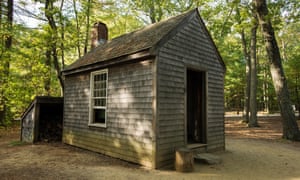Henry David Thoreau by Laura Dassow Walls review radical, unsettling, relevant
A superb new biography of the seer of Walden Pond reconsiders his reputation as tax-refuser, recluse, environmentalist and writer

In March 1845, Henry David Thoreau borrowed an axe and set off for Walden Pond, near his home in Concord, Massachusetts. He was going to build a hut, and he knew exactly where: on a spot near the water, backed by a pine grove and fronted by smaller pines and a chestnut tree. Before stopping for his first lunch break, Thoreau had cut and trimmed enough of these pines to make the houses main timbers.
Then he paid $4.28 to buy a shanty from a railroad worker who was moving on the line had just been built past Walden Pond. Thoreau dismantled it and dried its planks in the sun to become the huts roof and sides. He laid a chimney foundation using cobblestones from the pond. When he finished the house that autumn, it had weatherproof shingles on the outside, neat plastering inside and a few carefully counted possessions: three chairs, a desk, one cup, two forks. He planted rows of potatoes, corn and peas and miles of white beans making the earth say beans instead of grass, as he put it. The project had begun: Thoreau would live there, dedicating himself to the principle of simplicity. He would observe nature and write.
The idea had come from his friend and neighbour, Ralph Waldo Emerson, who said a writer must have a hideaway. Walden was an obvious choice: Thoreau knew it well, and had spent lazy days in his youth drifting in boats on the pond, playing his flute. Now, he had a more serious purpose. He lived for two years in the hut, then spent a further seven working up his notes for publication. When he produced Walden, he made the earth say a lot more than beans. This cranky, observant, mystical, polemical, exhilarating masterpiece became a classic of 19th-century Americana, studied by schoolchildren and stuffed into pockets for journeys on the road with generations of young idealists. Through this and his essay Civil Disobedience, which urged non-violent political resistance and the principled withholding of taxes, Thoreau called on Americans to tune in, drop out and seize control.
Walden had a rousing effect on me when I first read it. It still does, but I now find it disquieting, too. Besides nature lovers, Thoreau speaks to a spirit of refusal that runs through the modern US (and elsewhere). This spirit rejects political institutions, large-scale civic structures and tax-paying, in favour of holing up in a woodland fastness following only ones raw sense of personal rightness. It unnerves me to read the famous line in Civil Disobedience, That government is best which governs not at all. It sounded good once; now it evokes the kind of thinking that considers public healthcare an evil.
Others have raised milder doubts. After Walden came out, Thoreaus friends and critics alike voiced surprise at the books portrayal of a proud recluse, when they knew that Thoreau had gone on doing regular handyman work around Concord during those years, as well as popping home once a week for dinner prepared by the family cook. Friends visited him all the time, despite his lack of a full set of forks. He was a frequent visitor to other households so much so that Emersons young son Edward was surprised to learn that Thoreau had been officially resident at the pond during a time when he thought the writer was living with them.

In her superb new biography, Laura Dassow Walls defuses such cavils with a wry, understated humour. No other male American writer, she says, has been so discredited for enjoying a meal with loved ones or for not doing his own laundry. That quiet male is characteristic; like Thoreau, Walls lets her sharpest observations slip through to the readers consciousness without touching the sides. The observations and interpretations are not hammered home, yet they are persuasive. She gives us a Thoreau who is more interesting, more intellectually curious and more subtle than I (for one) had given him credit for despite his unsettling side, or perhaps because of it. Exploring his environmentalism and radicalism, she shows us why he might be worth reading differently in the 21st century.
The standard biographical way-stations are all covered. Walls explores Thoreaus childhood in Concord, his far from glittering years at Harvard, where he felt out of place (though he did master five languages and would spend his Walden evenings reading Homer in Greek), and his early attempts at schoolmastering. She then focuses on his writing life. Walls inspires us to read not just Walden, but his lectures, his essays and especially his journal.
This downright weird journal forms a backbone to his life and in Wallss biography is a theme in itself. He began it while under Emersons spell, opening it by quoting a question asked by his mentor: What are you doing now? Do you keep a journal? Later, his journal-keeping picked up tempo by adapting a modest volume of Nature Notes kept by his brother, John, who had died horribly from tetanus following a slight skin cut. Where John simply noted what he saw, Thoreau took it into a different dimension. Walls describes the uncanny feeling she had looking at this notebook, where Henrys raw and angular handwriting spills down the page, ripping open a vortex in Johns tidy checklist.
Later, Thoreau repurposed the journal as a professional naturalists log, but combined this with an attempt to capture every moment of each days experience, writing pencil notes almost continuously and transcribing them the next morning. (He used Thoreau family pencils, incidentally: their fortune had started from a graphite find, and he continued to work out ways of refining the pencils hardness.) By delicately juxtaposing her stories, Walls implies an intriguing possibility as to why this shift of style may have occurred. At around the same time, his friend Margaret Fuller had died in a shipwreck with her family, leaving Thoreau in grief. He wrote to himself: If you can drive a nail, and have any nails to drive, drive them … Be native to the universe. Perhaps, faced as well with the loss of his brother, Thoreau was attempting the impossible with his journal: to capture and preserve every scrap of experienced existence before it vanished.
Walls biography allows Thoreau to breathe his own air on her pages, while turning her critical gaze on each of the public roles he played as political activist, mystic, tax refuser and environmentalist. In the end, they all come together in Thoreau the writer the person who said: A man writing is the scribe of all nature he is the corn and the grass and the atmosphere writing.
Writing, for Thoreau, meant living with full attention and awareness living deliberately at every moment, in the sense of applying proper deliberation to his life. It meant, Walls says, living so as to perceive and weigh the moral consequences of our choices. If this isnt a reason to see Thoreau as a man with something to say to our times, I dont know what is.
Henry David Thoreau: A Life by Laura Dassow Walls (Chicago, 26.50). To order a copy, go to bookshop.theguardian.com or call 0330 333 6846. Free UK p&p over 10, online orders only. Phone orders min. p&p of 1.99.
